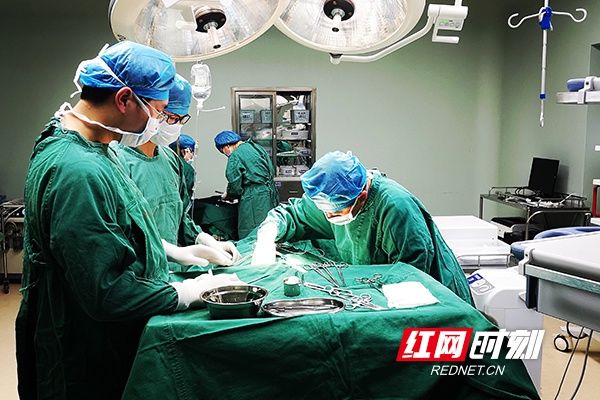
Surgery site.
Red Net Moment News, April 26th (Correspondent Liu Jianwu) Recently, the fifth ward (general surgery) of Loudi Hospital of Traditional Chinese Medicine successfully treated a case of incarcerated hernia with intestinal necrosis, Severe patients with septic shock and electrolyte imbalance reflect the high level of diagnosis and treatment of difficult and critical cases by general surgery, and demonstrate the advantages of combined treatment of various departments in the hospital.
Lao Liu was 78 years old and was admitted to the emergency department on April 8. He had a history of right inguinal hernia for more than 10 years, and he had not been treated. Three days before admission, an irreversible mass appeared in the right groin. , accompanied by abdominal distension and pain, which began to worsen on the day before admission, accompanied by nausea and vomiting, severe abdominal pain on admission, accompanied by nausea and vomiting, poor mental state, and later diagnosed as severe septic shock, incarcerated right inguinal hernia and possible intestinal necrosis , Diffuse peritonitis, electrolyte disturbance, hypoalbuminemia, acute renal injury, combined with severe pneumonia and pleural effusion.
After admission, general surgery quickly established venous access for anti-shock therapy for patients, and actively improved preoperative preparations. Considering the patient’s 78-year-old age, poor constitution, many underlying diseases, poor cardiopulmonary function, and septic shock, the risk of surgery is very high, but incarcerated hernias will be life-threatening without emergency surgery. Department Director and Deputy Chief Physician Zheng Zhongguo started the MDT mode, organized multidisciplinary consultations with related departments such as anesthesiology, cardiovascular medicine, respiratory medicine, endocrinology, etc., formulated solutions, and fully communicated with the patient’s family before performing intestinal resection and intestinal anastomosis. A 40cm-long necrotic bowel was excised. Through the cooperation of the surgeon and the anesthesiologist, the patient underwent a smooth operation and returned to the ward safely.
With the efforts of all medical staff after the operation, the patients overcame hypoalbuminemia, hypokalemia, dyspnea and hypoxemia caused by severe pneumonia and lobar atelectasis, kept the airway unobstructed, and pumped out a large amount of patients. Foul-smelling purulent sputum, prevention of post-operative complications such as pressure injury, and TCM-specific treatments such as traditional Chinese medicine encapsulation and acupoint injection to accelerate postoperative recovery, the condition gradually improved, breathing was stable, and blood oxygen saturation improved. The postoperative infection was successfully passed, and the patient recovered and was discharged from the hospital in the near future.
Hernia is one of the most common diseases in general surgery, including indirect inguinal hernia and direct inguinal hernia, which can occur in children, adults and elderly patients. Most of the hernias usually have no symptoms, and are manifested as a reducible mass in the groin. There is no discomfort such as pain, but the appearance is abnormal. If the contents of the hernia cannot be absorbed suddenly, and symptoms such as pain occur, it is called an incarcerated hernia. Severe cases may be accompanied by acute intestinal obstruction symptoms such as paroxysmal local colic, nausea and vomiting, constipation, and abdominal distension. The main complication of incarcerated hernia is strangulation of abdominal organs, which may develop into intestinal necrosis, diffuse peritonitis, and septic shock if not treated in time. Once diagnosed, emergency surgery should be performed.
The general surgery department of Loudi Hospital of Traditional Chinese Medicine closely follows the forefront of modern specialties, fully highlights the characteristics of traditional Chinese medicine, and maturely carries out various difficult surgical operations. Regulates the body’s immunity, greatly reduces the risk of surgery, speeds up postoperative recovery, and ensures that every high-risk elderly patient can undergo safe surgery and can recover and be discharged in a timely manner. On the basis of traditional open surgery, minimally invasive, Laparoscopic surgery is featured, and after surgery, it is supplemented with traditional Chinese medicine treatment such as traditional Chinese medicine packaging and acupoint injection to accelerate the recovery of patients after surgery. Minimally invasive surgeries such as laparoscopic hepatectomy, laparoscopic cholecystectomy, laparoscopic common bile duct exploration, laparoscopic appendectomy, laparoscopic hernia surgery, and laser closure of the great saphenous vein are routinely performed.